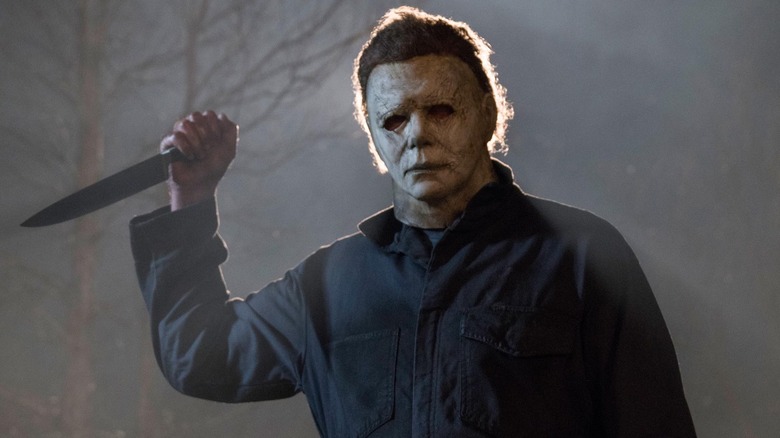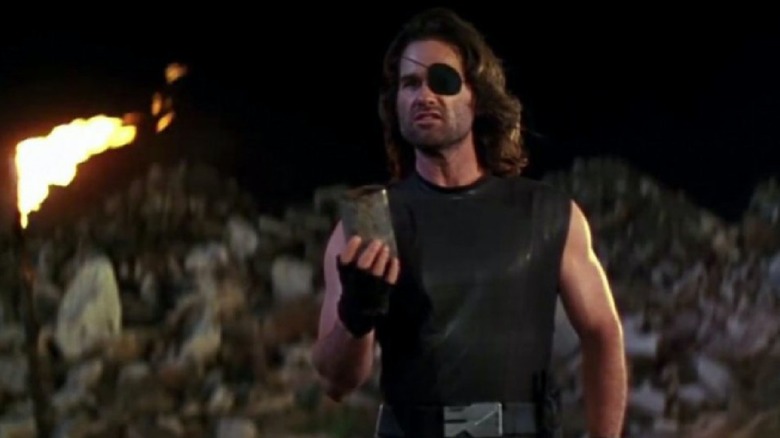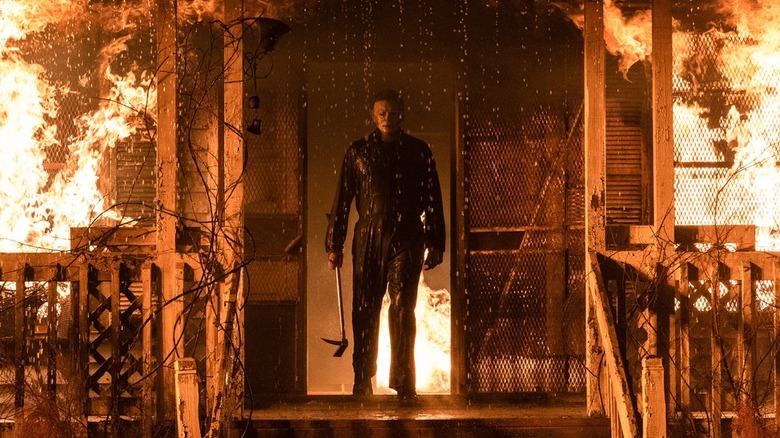Why John Carpenter Doesn't Watch A Lot Of Modern Horror Movies
John Carpenter is often celebrated for his contributions to the horror genre, but it shouldn't go unnoticed that he is quite versatile as a filmmaker. In addition to the "Halloween" franchise and a slate of horror films including "The Fog" and "In the Mouth of Madness," Carpenter is also known for notable action films such as "Escape From New York" and "Assault on Precinct 13." You could argue that "The Thing" and "They Live" are as relevant today in the midst of a global pandemic and political strife as they were the day they were made. However, it is the horror genre where Carpenter's signature style comes through.
Carpenter's films are clinics in tension-building, using point-of-view shots — such as the first shot of "Halloween," which takes us through Michael Myers' childhood home — and Steadicam tracking shots to give us a sense of the space his characters occupy. But it might surprise many to find out that the filmmaker, often referred to as the "Master of Horror," no longer watches a lot of horror movies.
'There are just so many of them'
John Carpenter is the most notable horror filmmaker to emerge from the "film brats" of the New Hollywood movement in the late 1960s and 1970s. The "film brat" isn't defined by notoriety, but rather how they came into their craft. Rather than come up through the studio system like most filmmakers of the past, the "film brats" learned about film by watching film and honed their skills at newly formed cinema programs at universities across the country. Carpenter was no different — he attended the USC School of Cinematic Arts, where his first student film shared a bit of DNA with the eventual "Halloween" franchise. But these days, his viewing habits have changed a little.
Just after Carpenter's 70th birthday, Rotten Tomatoes interviewed the legendary filmmaker. When asked about his viewing habits, Carpenter said:
"I get to catch up on some of the mainstream stuff. There are so many horror films being made at all sorts of levels. There are just so many of them. And I'm sure a bunch of them are really good. I just don't take the time to find out."
Ironically, the current horror landscape Carpenter helped create is now producing so much content that there's essentially too much to watch. After all, he drew up the blueprint for success with the 1978 low-budget "Halloween." The film would become one of the most successful independent films of all time, grossing more than $47 million on just a $325,000 budget, according to Box Office Mojo. The film inspired a spate of "supernatural" killers and a sub-genre of holiday-themed serial killer films such as "Friday the 13th," "Silent Night, Deadly Night," and "My Bloody Valentine."
But just because he isn't watching as much doesn't mean he hasn't stayed busy.
What exactly has Carpenter been doing?
Carpenter's contributions to the horror landscape might only be matched by his impact on how film scores are developed. As Spin notes, his style of complex synthesized scores created a new genre in film composition. Music has been much of his focus since taking a step back from the business of making movies. In fact, it's become a family affair. Carpenter has a band comprised of his son Cody and his godson Daniel Davies, who is the son of The Kinks guitarist Dave Davies. Since 2015, the trio released three studio albums, "Lost Themes I-III," which are synth-heavy scores for non-existent movies. They've also gone on tour and re-recorded some of Carpenter's classic soundtracks.
If it sounds ambitions for a 74-year old, don't worry, Carpenter is also finding time to relax. He says he is excited about the new storytelling art form of video games and cites "Fallout 76" (of course) as one of his favorites. Carpenter even took to Twitter to praise "Assassin's Creed Valhalla."
ASSASSIN'S CREED VALHALLA is a return to excellence in the franchise. Massive open world, beautifully designed, with great gameplay. Incredible game.
— John Carpenter (@TheHorrorMaster) November 25, 2020
And though he doesn't watch many horror movies anymore, Carpenter believes scary movies will be around for a long time. He explained to Esquire how the genre is fed by our fears, saying:
"Right from the beginning, from the early Universal horror movies—they were there during the Depression. People flocked to them. Horror is always going to be with us."
Carpenter returned to his roots in 2018 by getting involved with the first "Halloween" film since directing the 1981 sequel. He composed the score for director David Gordon Green's movie and served as executive producer/creative consultant. Though Carpenter wasn't involved in the most recent iteration of the franchise, 2021's "Halloween Kills," Green calls the film a "love letter to John Carpenter."
It is hard to guess what's next for John Carpenter. It could be any number of things — maybe Blumhouse could try lure him back out of retirement — but one thing he probably won't be doing any time soon is catching up on all the modern horror movies he's missed.


